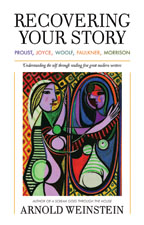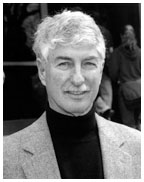April 19, 2006: Reading Room
Arnold Weinstein ’62’s book is a guidebook for readers trying to make their way through Proust, Joyce, Woolf, Faulkner, and Morrison. (Courtesy Providence Journal Company) |
Recovering
your story
Arnold Weinstein ’62 helps readers dig into modernist
fiction
When Arnold Weinstein ’62 first read Ulysses, James Joyce’s stream-of-consciousness novel that chronicles one day in the lives of Dubliners Stephan Dedalus and Leopold and Molly Bloom, he got through only the first 100 pages or so. “I thought it was gibberish,” says Weinstein, then a sophomore at Princeton. “It was ... needlessly complicated. No ordinary reader could possibly make his way into that book.” He threw the book away in disgust.
That was an inauspicious experience for a man who would end up passing along his passion for the very kind of modernist novel that Joyce wrote. Weinstein did eventually read the whole of Ulysses in graduate school. Over the next 40 years, he has read it at least 10 times and taught it to two generations of students at Brown University, where he is a professor of comparative literature.
 In
his book Recovering Your Story: Proust, Joyce, Woolf, Faulkner, Morrison,
Weinstein helps people who at first think modernist novelists like Joyce
are beyond their reach — or people who have read these works but
never “got them” — not only to understand the novels
but even to enjoy them. Published in March by Random House, Recovering
Your Story decodes Joyce’s Ulysses, Marcel Proust’s
Remembrance of Things Past, Virginia Woolf’s Mrs. Dalloway
and To the Lighthouse, William Faulkner’s The Sound
and the Fury and Absalom, Absalom!, and Princeton professor
Toni Morrison’s Sula and Beloved. Weinstein helps
readers navigate through the most important sections of the novels, explaining
significant scenes and characters and asking readers to think about how
a situation might relate to one’s own life.
In
his book Recovering Your Story: Proust, Joyce, Woolf, Faulkner, Morrison,
Weinstein helps people who at first think modernist novelists like Joyce
are beyond their reach — or people who have read these works but
never “got them” — not only to understand the novels
but even to enjoy them. Published in March by Random House, Recovering
Your Story decodes Joyce’s Ulysses, Marcel Proust’s
Remembrance of Things Past, Virginia Woolf’s Mrs. Dalloway
and To the Lighthouse, William Faulkner’s The Sound
and the Fury and Absalom, Absalom!, and Princeton professor
Toni Morrison’s Sula and Beloved. Weinstein helps
readers navigate through the most important sections of the novels, explaining
significant scenes and characters and asking readers to think about how
a situation might relate to one’s own life.
At first glance, characters such as the narcissistic narrator of Remembrance of Things Past might seem to have little to offer readers in 2006. But Weinstein disagrees. When Proust gets us into the head of this character and shows us his inner mind at work, we are encouraged to examine all the people we have been over time. We are called to discover our own stories.
These books are not just about consciousness; they are also about relationships with other people, Weinstein argues. These writers help us see that just as our own thoughts are invisible to people around us, other people’s motivations are invisible to us. “Everybody is ... a little bit murky,” says Weinstein. “At some point” these modernist novelists “lead us into the world” — as Woolf leads us into the lives of Clarissa’s friends at her party in Mrs. Dalloway.
Morrison, he says, continues the modernist tradition but adds something new. In Beloved, Morrison suggests that if one’s past is so horrific — because of slavery — recovering those memories and those past selves might destroy a person.
“Reading these books is labor-intensive,” admits Weinstein.
But so is trying to understand Picasso or the geopolitical world we live
in, he says. “Somewhere we got the notion that art is supposed to
be easy.” ![]()
By K.F.G.
BOOK SHORTS
 Small Giants: Companies That Choose to Be Great Instead of Big
— Bo Burlingham ’68 (Portfolio/Penguin). The author profiles
14 small companies in various industries that have resisted opportunities
to raise a lot of capital and grow very fast. Instead these companies,
to their advantage, argues Burlingham, have remained privately owned,
committed to their products and employees. Burlingham is editor-at-large
at Inc. magazine.
Small Giants: Companies That Choose to Be Great Instead of Big
— Bo Burlingham ’68 (Portfolio/Penguin). The author profiles
14 small companies in various industries that have resisted opportunities
to raise a lot of capital and grow very fast. Instead these companies,
to their advantage, argues Burlingham, have remained privately owned,
committed to their products and employees. Burlingham is editor-at-large
at Inc. magazine.
 Barney Ross — Douglas Century ’86 (Schocken/Nextbook).
In this biography of the Jewish boxer Barney Ross, the author traces the
future boxer’s difficult childhood in a tough Chicago neighborhood
in the 1920s and 1930s; his efforts to help reunite his family by making
money through petty thievery, gambling, and eventually boxing; and his
valor in combat during World War II. Ross also worked for the creation
of Israel. Century is a writer in New York City.
Barney Ross — Douglas Century ’86 (Schocken/Nextbook).
In this biography of the Jewish boxer Barney Ross, the author traces the
future boxer’s difficult childhood in a tough Chicago neighborhood
in the 1920s and 1930s; his efforts to help reunite his family by making
money through petty thievery, gambling, and eventually boxing; and his
valor in combat during World War II. Ross also worked for the creation
of Israel. Century is a writer in New York City.
 The Doctor’s Complete College Girls’ Health Guide: From Sex
to Drugs to the Freshman 15 — Jennifer Wider ’94
(Bantam Dell). This resource book for women includes advice on how to
deal with health issues that may crop up in college. Through a question-and-answer
format, the author covers everything from how to spot problem drinking
and what to do about it, to how to treat migraines and sexually transmitted
diseases. Wider is a physician and medical journalist.
The Doctor’s Complete College Girls’ Health Guide: From Sex
to Drugs to the Freshman 15 — Jennifer Wider ’94
(Bantam Dell). This resource book for women includes advice on how to
deal with health issues that may crop up in college. Through a question-and-answer
format, the author covers everything from how to spot problem drinking
and what to do about it, to how to treat migraines and sexually transmitted
diseases. Wider is a physician and medical journalist. ![]()
By K.F.G.
For a complete list of books received, click here.

